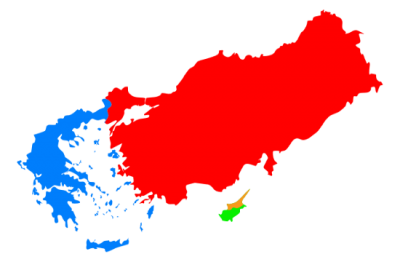Greece and Turkey Clash in NATO Teleconference Waging Mini War of Words

A NATO teleconference last week saw Greek Foreign Minister Nikos Dendias and Turkish Foreign Minister Mevlüt Çavuşoğlu engage in a mini war of words, with accusations made by both sides against each other. Çavuşoğlu took the Council of Foreign Ministers of NATO meeting as an opportunity to push accusations that Greece tortured and killed illegal immigrants as they attempted to enter the European country illegally with Turkish support.
Dendias was quick to highlight that Turkey was blatantly violating the Alliance’s supposed core ‘values,’ prompting Çavuşoğlu to rise from his seat and demand that he be able to respond, which was quickly rejected by NATO Secretary General Jens Stoltenberg. The Turkish Foreign Minister even made another demand to be the final speaker of the teleconference, which was again rejected by Stoltenberg, prompting Çavuşoğlu to abruptly leave the meeting early.
In the aftermath of the meeting, Dendias went to Twitter to say
“There is a very basic misunderstanding on the part of Turkey. Alliance and solidarity between allied countries is not an option. They are not separate issues. It is total.”
He continued to highlight that it is well known that Turkey orchestrated the migrant crisis in March, but that Athens still wants to have positive relations with Ankara.
Although this may seem like a minor victory in Dendias’ eyes against the ‘Old Enemy,’ there is no suggestion that this has placed Greece on any higher pedestal than Turkey within NATO. Both Greece and Turkey became NATO members in 1952, becoming the first new members of the alliance since its formation with 12 original founders. Despite technically becoming NATO ‘allies,’ relations have remained hostile between Greece and Turkey, mostly notably during the 1955 Istanbul pogrom when the Greek population of the city decreased from 116,108 to 49,081, the Turkish invasion of Cyprus in 1974 and the 1996 Imia Islet crisis.
A February 2020 poll by the highly-reliable Pew Research Center found that the majority of people in Greece (51%) and Turkey (55%) viewed NATO unfavourably – the only states of the 16 NATO members surveyed to view the U.S.-led organization in this way. For the Greek people, their frustration with NATO is that in 2019 alone, war planes belonging to NATO ‘ally’ Turkey violated Greece’s airspace 4,811 times and Ankara redrew the maritime borders of the Eastern Mediterranean on a map that claimed large swathes of Greece’s maritime space, including inhabited islands. From the Turkish perspective, they are frustrated that the U.S. openly supports the Kurdish People’s Protection Units (YPG), a Syrian extension of the Kurdistan Workers Party, that Ankara claims is a terrorist organization, and NATO not backing Turkey’s invasion of Idlib because of Greece’s veto.
However, the key difference is that Ankara attempts to manipulate NATO to achieve its geostrategic goals by also pandering to Russia. The Greek leadership on the hand takes a completely subservient role regarding NATO and makes little effort to improve its relations with Russia or become an independent state in the new multipolar system. Although only 37% of Greeks are favourable to NATO, successive governments since the collapse of Yugoslavia have hedged its bets behind the Alliance, despite having little reason to.
Turkish air violations against Greece continue unabated on a daily basis, migrants continue to try and illegally enter Greece from Turkey, and challenges to the sovereignty of Greek islands are always made, yet there has been little to no condemnation from NATO for Turkey’s actions.
In fact, only last week Secretary General Jens Stoltenberg announced the appointment of a group of 10 experts to support his work in a reflection process to further strengthen NATO’s political dimension. This “reflection group” included the participation of Turkey, but not Greece, once again demonstrating that the Alliance will always favour Turkey to Greece as it occupies one of the most geostrategic locations in the world.
Athens will once again be compliant and not push its stake to serve Greek interests. Although the Greek people are overwhelmingly anti-U.S. and pro-Russia, it has not been reflected on government policy. This has become especially apparent since the 2008 financial crisis that crippled Greece. The country has been ruled by governments subservient to not only NATO demands ever since, but also European Union ones to ensure that the crippling IMF debt can continue to be imposed.
Effectively Greece has been hijacked by a ruling elite that continues on the same path of subserviency to NATO – no matter the political party in power. So long as Athens refuses to acknowledge the world’s power structures are changing from U.S. global hegemonic unipolarity to a balanced multipolar system, it will continue to serve NATO and have none of its interests recognized or met by the Alliance.
Meanwhile, Turkey will continue its attempts to play both Washington and Moscow for its own interests. Ankara has acknowledged the changing world system, but rather than use this new reality to seek balance in the region, it is using it to project its own influence and power in an aggressive manner. Although it failed in its invasion of Idlib and Libya, and to flood Greece with illegal immigrants in March, it will continue its pursuit of regional hegemony.
Rather, it serves both Greece and Turkey well to truly accept multipolarity for what it is – a system of balanced power.
*
Note to readers: please click the share buttons above or below. Forward this article to your email lists. Crosspost on your blog site, internet forums. etc.
This article was originally published on InfoBrics.
Paul Antonopoulos is a Research Fellow at the Center for Syncretic Studies.

